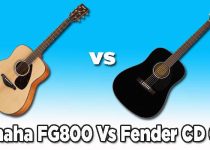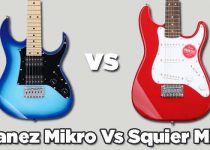Is Poplar Wood Good for Guitars? [The Truth]
If you’re considering buying a new guitar, you may have come across guitars made from poplar wood. But is poplar wood a good choice for guitars? Let’s delve into the truth about poplar wood and its suitability for guitars.

# Table of Contents =>
- 1 The Benefits of Poplar Wood in Guitars –
- 2 Comparing Poplar Wood with Other Guitar Woods –
Main Things:
- Poplar wood is frequently used in lower-end guitar models due to its affordability and easy availability.
- Poplar wood offers a sound similar to Alder, with a broad frequency range and good resonance.
- It is a cost-effective option, making it ideal for budget-friendly guitars.
- Poplar wood provides a bright and clean tone with good sustain, working well with different types of pickups.
- While not as durable as some other hardwoods, poplar wood guitars can withstand regular use and typical wear and tear.
The Benefits of Poplar Wood in Guitars –
Poplar wood offers numerous benefits when utilized in the construction of guitars. Whether you’re a beginner guitarist or looking for a more affordable option, poplar wood can deliver satisfactory results. Here are some key advantages of using poplar wood:
1. Bright and Clean Tone:
Poplar wood is known for providing a bright and clean tone with good sustain. It has a balanced frequency response, offering a versatile sound that works well with different styles of music. While it may not have the same warmth as mahogany or the pronounced snap of ash, poplar wood is well-suited for handling single-coil, humbucker, and P90 pickups.
2. Cost-Effective Option:
One of the significant advantages of poplar wood is its affordability. It is an excellent choice for budget-friendly guitars without compromising on quality. Brands like Squier and PRS often use poplar wood in their lower-end models, making it accessible to a wide range of players.
3. Versatility in Construction:
Poplar wood is favored by luthiers for its versatility. It is lightweight, making it easy to handle and work with during guitar construction. The wood’s resonance properties contribute to the overall tone and playability of the instrument. Additionally, poplar wood is compatible with various types of finishes, allowing for customization options to suit individual preferences.
| Advantages of Poplar Wood in Guitars |
|---|
| Bright and clean tone |
| Cost-effective option |
| Versatility in construction |
In summary, poplar wood offers several benefits when used in the construction of guitars. It provides a bright and clean tone, making it suitable for various musical styles. The affordability of poplar wood makes it an excellent choice for budget-friendly instruments, without compromising on quality. Its lightweight nature and versatility in construction further contribute to its appeal. Consider poplar wood as a viable option for your next guitar.
Comparing Poplar Wood with Other Guitar Woods –
When considering the suitability of poplar wood for guitars, it is essential to compare it with other commonly used guitar woods. While poplar wood is not classified as hardwood, it is still a solid material widely utilized in the construction of guitars, especially in more affordable models. Poplar wood is known for its softness, which makes it easy to work with and cut. However, it may not be as durable as hardwoods like mahogany or ash, making it more susceptible to damage from falls or impacts.
While poplar wood may not have the same level of durability as other woods, it offers unique advantages that make it a viable option for guitar players of all skill levels. Its lightweight nature makes it comfortable for extended playing periods, and its affordability makes it an attractive choice for those on a budget. Additionally, poplar wood is known to provide a bright and clean tone with good sustain, making it suitable for various musical styles.
a) Poplar Wood vs Basswood Guitar:
Another wood commonly used in guitars, particularly in mid-range models, is basswood. When comparing poplar wood with basswood, it is important to note that both woods share similar characteristics. Both poplar and basswood are considered lightweight and provide a balanced tone with good sustain. However, poplar wood tends to have a brighter tonal character, while basswood offers a slightly warmer sound. Ultimately, the choice between the two will depend on personal preference and the desired tonal qualities.
| Poplar Wood | Basswood |
|---|---|
| Lightweight | Lightweight |
| Bright, clean tone | Warm tone |
| Good sustain | Good sustain |
b) Is Poplar Wood a Hardwood?
No, poplar wood is not classified as a hardwood. Hardwood refers to wood derived from deciduous trees, while poplar wood comes from the poplar tree, which is a type of softwood. Despite its softwood classification, poplar wood is still widely used in guitar construction due to its favorable tonal characteristics and ease of workability. It is important to note that the designation of hardwood or softwood does not solely determine the quality or suitability of wood for guitar-making.
The Durability of Poplar Wood Guitars –
When it comes to the durability of poplar wood guitars, it is important to consider their overall sturdiness and resilience. While poplar wood may not be as hard as other hardwoods used in guitar construction, it still offers a level of durability that can withstand regular use and typical wear and tear. However, it is worth noting that guitars made from poplar wood may be more susceptible to damage from falls or impacts compared to guitars made from harder woods like mahogany or ash.
Despite its slightly lower durability compared to other hardwoods, poplar wood has its advantages. One of the key benefits is its lightweight nature, which makes it comfortable to play for long periods without causing strain. Additionally, poplar wood offers good resonance and tonal qualities, contributing to a pleasant sound experience.
Comparing the Durability of Poplar Wood with Other Guitar Woods –
Table: Durability Comparison of Popular Guitar Woods
| Wood Type | Durability | Weight | Tonal Characteristics |
|---|---|---|---|
| POPLAR | Medium | Lightweight | Bright, resonant |
| Mahogany | High | Medium to Heavy | Warm, rich |
| Ash | High | Medium to Heavy | Bright, punchy |
As shown in the table above, poplar wood falls in the medium range when it comes to durability. However, its lightweight nature makes it a popular choice for players who prioritize comfort and ease of playability. It’s important to note that the choice of wood for a guitar ultimately depends on personal preference, playing style, and budget. While poplar wood may not be the most durable option, it can still provide a satisfactory playing experience for beginner guitarists or those looking for an affordable alternative.
The Use of Poplar Wood in High-End Guitars –
When it comes to high-end guitars, you might be surprised to learn that poplar wood is a popular choice among renowned guitar brands. Fender, Ernie Ball, and Peavey are just a few examples of companies that utilize poplar wood in their custom shop or high-end models. Despite its association with affordability, poplar has proven to be a viable and versatile option for crafting high-quality guitars.
Poplar wood offers several advantages that make it an attractive choice for high-end guitars. One of its key benefits is its tonal capabilities. While poplar may not have the same depth and richness as more expensive woods like mahogany or rosewood, it delivers a bright and clean tone with good sustain.
Furthermore, poplar exhibits excellent workability, allowing luthiers to shape and craft the wood with ease. It is also a lightweight material, contributing to the overall weight and balance of the guitar. This makes poplar guitars comfortable to play for extended periods, especially during live performances.
| Advantages of Poplar Wood in High-End Guitars – | Disadvantages of Poplar Wood in High-End Guitars – |
|---|---|
|
|
In conclusion, despite its reputation as a more affordable option, poplar wood has earned its place in the realm of high-end guitars. It offers its unique tonal qualities and benefits, making it a suitable choice for players who appreciate its bright and clean sound. Whether you’re a beginner or a seasoned guitarist, poplar wood can provide a high-quality instrument that meets your expectations and budget.
Poplar Wood in Comparison to Other Guitar Woods –
When it comes to choosing the right wood for your guitar, there are several options to consider. Poplar wood, while not as renowned as mahogany or spruce, has unique characteristics that make it a viable choice for certain players. Here, we’ll compare poplar wood with mahogany and spruce to help you make an informed decision.
a) Mahogany vs Poplar Wood:
Mahogany is often favored for its rich and warm tone, making it a popular choice among guitarists. In comparison, poplar wood offers a brighter, cleaner tone with good sustain. While mahogany is known for its depth and resonance, poplar delivers a punchy and articulate sound. If you prefer a brighter tone that cuts through the mix, poplar wood may be the better option for you.
b) Spruce vs Poplar Wood:
Spruce is commonly used for guitar tops, as it provides clarity and a well-balanced tone. Poplar wood, on the other hand, offers a similar brightness but with a slightly different tonal character. Poplar has good sustain and can produce a clean and articulate sound. If you’re looking for a versatile wood that offers brightness and clarity, poplar can be a suitable alternative to spruce.
| Wood Type – | Tone | Sustain | Characteristics |
|---|---|---|---|
| POPLAR | Bright and clean | Good | Punchy and articulate |
| Mahogany | Rich and warm | Good | Deep and resonant |
| Spruce | Clarity and balanced | Good | Versatile and bright |
Ultimately, the choice between poplar wood, mahogany, and spruce will depend on your personal preference and the sound you’re looking to achieve. Each wood has its unique qualities, and experimenting with different combinations can lead to exciting results. Whether you’re a beginner guitarist or an experienced player, consider the tonal characteristics and your playing style to find the perfect wood for your guitar.
Conclusion:
In conclusion, poplar wood can be a suitable choice for guitars, especially if you are starting or looking for a more affordable option. While it may not have the same level of prestige as other more expensive woods, poplar offers its own unique characteristics and tonal qualities.
Poplar wood is frequently used in guitars, particularly in lower-end models produced by brands like Squier and PRS. It is chosen for its affordability and ease of availability. In terms of sound, poplar wood is very similar to Alder, offering a similar frequency spectrum range. It is also considered one of the easiest woods to work with due to its lightness and resonance.
When comparing poplar wood to other guitar woods, it is important to note that poplar is not classified as a hardwood. However, it is still a solid material commonly used in the construction of guitars, especially in cheaper models. Poplar wood is known for its softness, which makes it easy to work with and cut. While it may not be as durable as other hardwoods, its lightweight nature and affordability make it a viable option for players of all skill levels.
Ultimately, the choice of wood for a guitar should depend on personal preference, playing style, and budget. Poplar wood can provide a bright, clean tone with good sustain, making it a suitable option for many guitarists. Whether you are a beginner or an experienced player, poplar wood can deliver satisfactory results without breaking the bank.
Last Updated on December 11, 2023 by Perry Garner


